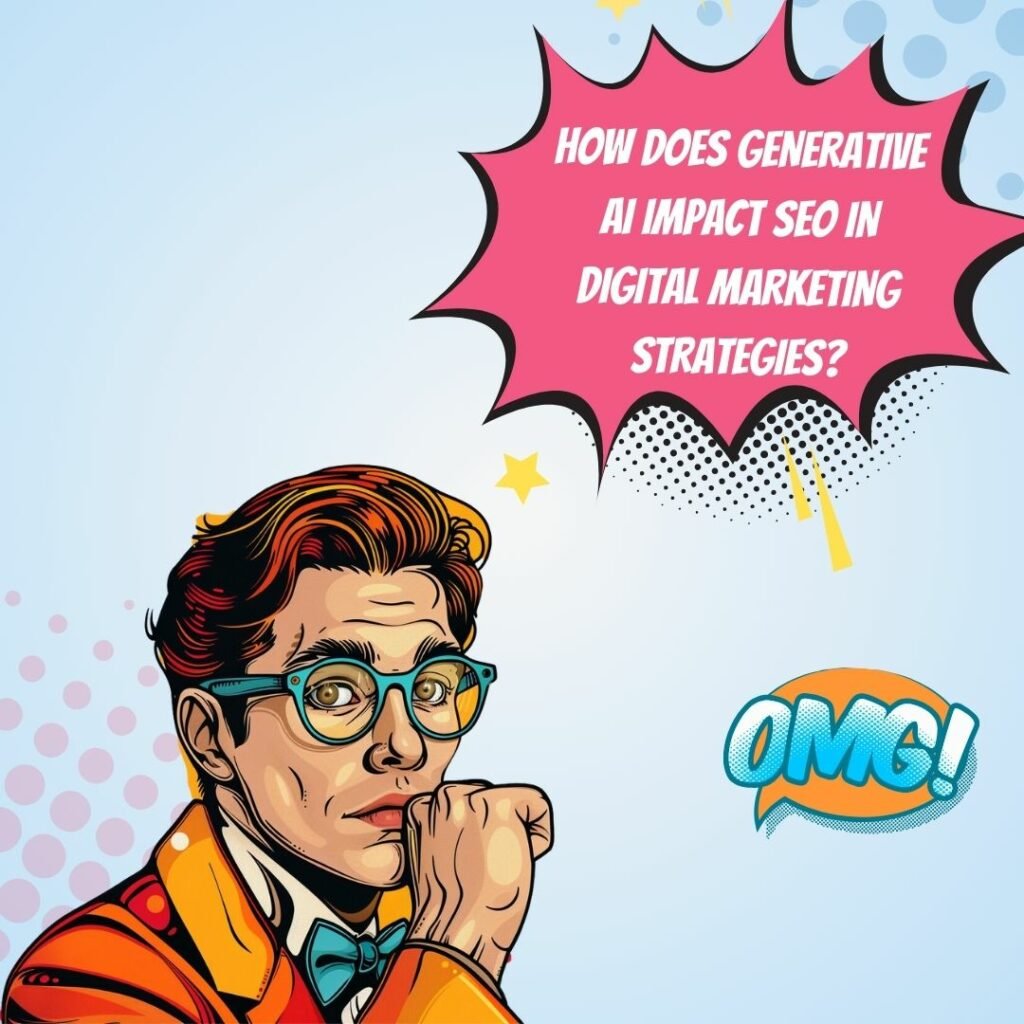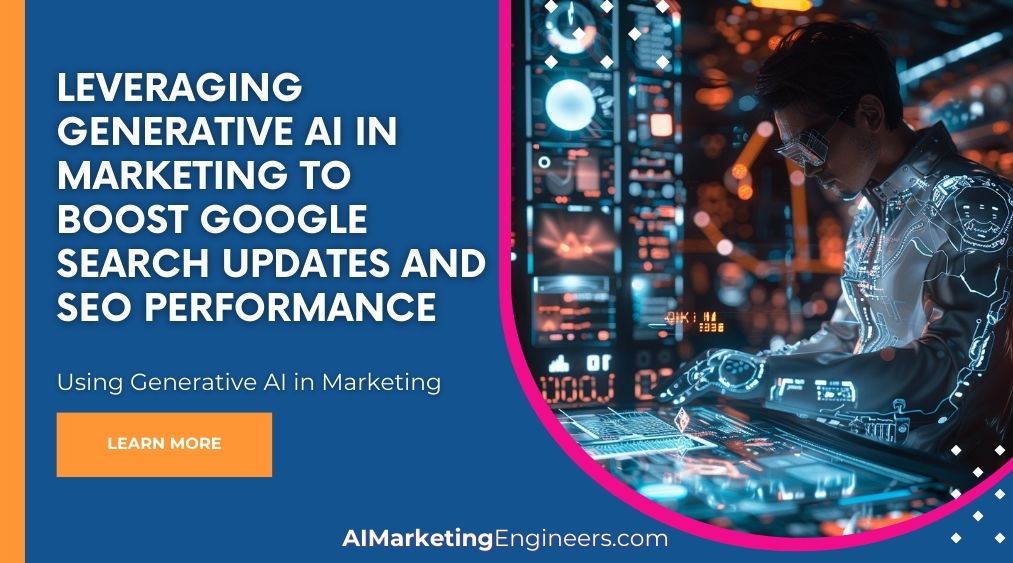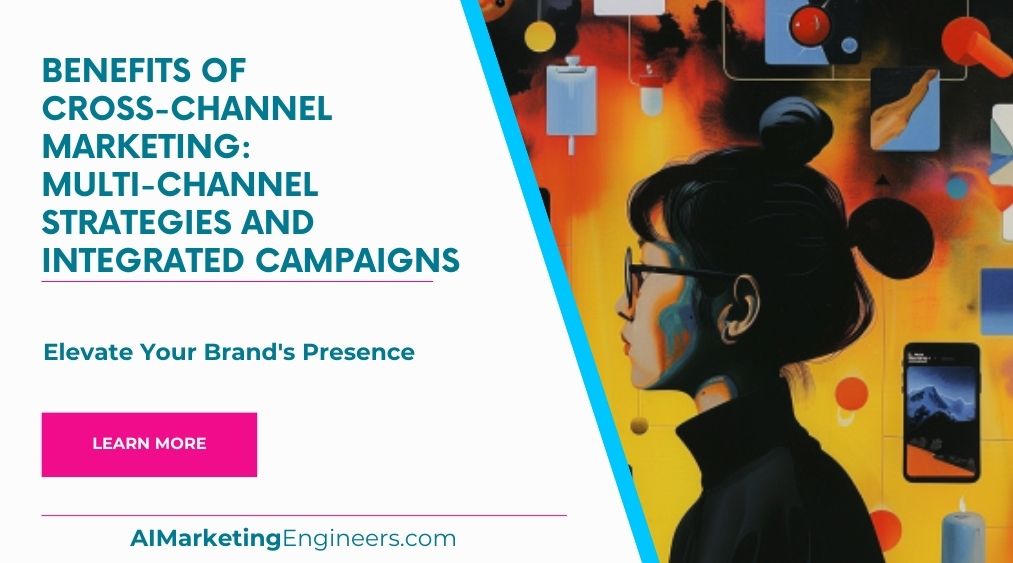Key Takeaways
✅ Focus on High-Quality, User-Centric Content: With Google's latest search advancements, it’s critical to create content that resonates with your audience's needs. Utilize generative AI not just for task automation, but for deeper insights and exciting, relevant content that seeks to deeply connect with your users.
✅ Optimize for AI-Powered Search: As generative AI reshapes content creation, understand how to optimize your content for AI-assisted searches. This means honing in on crucial entities on your web pages and matching them with search engine expectations to help your content stand out.
✅ Leverage AI for Personalization and Predictive Capabilities: Generative AI can churn out personalized content at an unprecedented scale. Tap into this technology to anticipate user trends and curate content that aligns precisely with what your audience seeks, thereby improving your search engine visibility.

Introduction
Ever wondered how you can break through the digital clutter and land that top spot in Google searches? Let's face it, the search engine game is ever-evolving, and staying on top requires not just creativity but also leveraging cutting-edge tools. Generative AI in marketing stands at this frontier, promising to transform SEO strategies and overhaul how we think about Google search updates. It's no secret that we're on the brink of a new era where artificial intelligence will play a pivotal role in how content climbs the rankings.
In this article, you're about to unlock modern trends and innovative solutions that could dramatically enhance your website's visibility and, ultimately, drive higher returns on your marketing spend. Get ready to dive into actionable insights and revolutionary AI-driven SEO practices that can set your content apart. The future of SEO beckons, and it's brimming with potential for those willing to embrace the power of generative AI.
Top Statistics
| Statistic | Insight |
|---|---|
| 84% of Searches on Google Will Be Impacted by SGE | With the rollout of Google's Search Generative Experience, a massive portion of searches will see shifts, compelling marketers to rethink and adjust SEO approaches. |
| 80% of Google Search Traffic is Informational | A huge segment of searches are to gather information. Crafting content that AI systems can easily interpret will be key to SEO success. |
| 75% of Google's Income from Ad Sales | The critical need for reliable search results is underscored by Google's ad revenue stake, indicating a hard stance against AI-generated spam will likely continue. |
| 40% of ChatGPT Traffic Goes to Google | The AI ecosystem is increasingly intertwined with search engines, suggesting strategic collaboration or integration offers potential growth. |
| 15-20% Sales Uplift from Personalized Content | Leveraging generative AI to customize content can result in a significant uplift in sales, underscoring the value of personalization in marketing strategies. |
The Convergence of Generative AI and SEO
Generative AI is making waves in digital marketing, particularly where it intertwines with Search Engine Optimization (SEO). It's not just a buzzword; it's a set of tools that is significantly altering the landscape. The power of Generative AI lies in its ability to create content, personalize experiences, and predict consumer behavior. Imagine a marketing world where messages are tailor-made for each individual, and your site’s content evolves before trends even become mainstream. This adaptive approach is redefining how businesses connect with customers and optimize for search engines. Moreover, AI can automate repetitive tasks, freeing up time for strategic planning. This seamless integration can lead to more efficient and effective marketing campaigns.
Using Generative AI for a Competitive SEO Edge
Scalability and personalization are at the heart of Generative AI's offering to SEO. With this technology, marketing teams can produce a wealth of high-quality content, each piece fine-tuned to the unique preferences of its intended audience. But it's the predictive nature of AI that’s particularly exciting – it gives the ability to foresee and adjust to trends, keeping a brand's SEO strategy several steps ahead of the competition. As engaging content reigns supreme, these tools also boost relevance and keep users hooked on your pages. Additionally, AI-driven insights can help identify new content opportunities that may have been overlooked. By staying proactive, brands can maintain a strong online presence.
Implementing Generative AI in SEO Strategies
To truly harness the power of Generative AI in SEO, one must begin by understanding user intent and recognizing the patterns in search behaviors. Analyzing vast sets of user data allows for the creation of content that hits the mark, meeting the precise needs of the searcher. Armed with AI, marketers can predict shifts in consumer interests and search patterns, staying ahead of the curve in a way that manual research simply can't match. This proactive approach enables the creation of content that anticipates and fulfills user needs. Furthermore, AI tools can streamline the content creation process, ensuring consistency and quality. Regularly updating content based on AI insights can keep your website relevant and engaging.
Optimizing for Google's Search Generative Experience (SGE)
Google has always been at the forefront of search innovation, and their Search Generative Experience (SGE) is no exception. Adapting to this AI-driven framework means focusing relentlessly on delivering quality content that addresses user needs. Brands must now consider how AI can generate useful summaries of their content to improve user experience, and leverage AI tools for a more effective content optimization process. The goal? To climb the search rankings by truly serving the searcher. Additionally, AI can assist in identifying and implementing effective keywords, boosting SEO performance. Keeping abreast of Google's updates ensures that your strategy remains aligned with the latest search trends.
Navigating the Pitfalls of Generative AI in SEO
With great power comes great responsibility – and Generative AI is powerful indeed. As marketers dive into this technology, they must be wary of creating low-quality, AI-generated spam. Maintaining a harmonious balance between AI-created and human-curated content is essential to preserve the authenticity and trustworthiness of a brand. Google's commitment to combating spammy content is strong, so staying within the bounds of quality is not just good ethics, it's good for visibility too. Regularly reviewing and refining AI-generated content can help maintain high standards. Transparency about the use of AI can also build trust with your audience.
The Future of SEO with Generative AI
The forward march of AI in SEO is inevitable. To stay competitive, embracing these changes is non-negotiable. Brands must refine their SEO strategies to include the capabilities of AI, always with a close eye on the latest advancements. As we look to the future, the integration of AI and user-generated content promises to create a more dynamic, responsive search environment. Marketers who understand and adopt these tools will not only survive the transition but thrive in the new, AI-infused search landscape. Continuous learning and adaptation will be key to leveraging AI effectively. Collaborating with AI experts can further enhance your strategy's success.
AI Marketing Engineers Recommendation
Recommendation 1: Leverage Generative AI to Craft High-Quality, SEO-Friendly Content: Integrating Generative AI in content creation can significantly boost your output while maintaining a high standard. Utilize AI tools to generate well-researched, contextually relevant content that aligns with the latest Google search updates. For example, AI can be programmed to mirror the writing style that performs best for SEO, incorporating desired keywords naturally, and ensuring readability aligns with Google’s evolving algorithms. Remember, though, the importance of human oversight cannot be overstated. Ensure that all AI-generated content is meticulously reviewed and edited to retain a genuine voice and comply with Google's E-A-T (Expertise, Authoritativeness, and Trustworthiness) guidelines.
Recommendation 2: Harness AI to Personalize User Experience and Increase Engagement: Using generative AI to analyze user data and behaviors allows for unprecedented personalization capabilities. Current trends suggest that users respond favorably to content that caters to their individual needs and preferences, which can promote higher engagement rates and improved SEO rankings. By using AI to sift through vast amounts of user data, brands can tailor content, product recommendations, and even interactive experiences to the individual, making each interaction with their digital presence more relevant and appealing. This can lead to increased time on page and better conversion rates, both of which are signals to Google that your content is valuable.
Recommendation 3: Implement AI-Driven Analytics to Stay Ahead of SEO Trends and Update Impact: Incorporating generative AI for predictive analytics enables marketing professionals to foresee changes in SEO trends and understand the impact of Google search updates on website performance. By analyzing historical data, current market behavior, and competitor strategies, AI helps anticipate shifts in search patterns and keyword relevance. Tools like Google Analytics AI can identify emerging trends, allowing marketers to adjust their strategies proactively. Plus, these insights can guide the allocation of resources to create content that capitalizes on these shifts, ultimately optimizing SEO performance in a way that is both responsive and data-driven.
Relevant Links
- Revolutionize Your Marketing Approach
- Predict and Adapt to Market Trends
- Transform Your SEO Strategy with Generative AI
- Nail Influencer Marketing in Korea
- Elevate Engagement with Social Media Content
Conclusion
In the dance of digits and algorithms where Generative AI meets SEO, we step into a future that redefines how content connects to people. It's an era where artificial intelligence doesn't just support marketing—it shapes it. As we teeter on the brink of an AI-infused digital landscape, we must recognize the transformative impact Generative AI has on search performance and user engagement.
We've waded through a sea of insights, from supercharging content creation without overwhelming your creative teams, to delivering that uncanny knack of personalization, which frankly, users have come to expect. The balance between human touch and AI sophistication has never been more delicate — or more crucial. Tipping the scales in favor of well-crafted, AI-augmented content can see your brand’s relevancy skyrocket in Google’s ever-evolving search experience.
But let's not forget the cautions that come with such power. The specter of low-quality, AI-generated filler content and the importance of maintaining authenticity reminds us that with great technology comes great responsibility. Google is watching, and so are your customers.
So, where do we stand as marketers, content creators, and strategists? Embracing Generative AI within the SEO toolbox isn’t just smart; it’s soon to be the standard. The time is ripe to look ahead, to evolve, and to prepare for an SEO strategy that holds its own in the face of AI advancements. Dive in, stay informed, and wield these AI tools with a craftsman's care. As we turn to the future, the question isn't if you will join this revolution—it's how soon.
FAQs
Question 1: What is generative AI in marketing?
Answer: It's pretty much like having a robot buddy that helps you make cool ads, write ups, and even videos. It's all about making life easier for marketers to create awesome stuff for their brand, real quick.
Question 2: How does generative AI enhance Google search updates?
Answer: Imagine someone who makes your Google searches feel like they've been tailored just for you. That's generative AI working behind the scenes, helping Google get you the answers you're really looking for.
Question 3: What is the role of generative AI in SEO performance?
Answer: Think of generative AI as your secret weapon for getting noticed on the internet. It helps you write in a way that search engines love, which can help more people find your website.
Question 4: How does Google's Performance Max campaign use generative AI?
Answer: Performance Max is like a smart art studio. It uses generative AI to whip up new texts and pictures for ads that not only look good but also work hard to get you results.
Question 5: What are AI Overviews in Google search?
Answer: AI Overviews are those handy snippets at the top of your Google searches. They're the quick answers to your questions, crafted by generative AI to give you what you need without all the clicking around.
Question 6: How does generative AI impact search engine optimization (SEO)?
Answer: It's a bit of a mixed bag. Generative AI can be great for making your site pop on search engine lists, but if it's not used wisely, it could end up making a mess with spammy content.
Question 7: How can marketers use generative AI effectively in their campaigns?
Answer: Marketers should buddy up with generative AI to make high-quality content that speaks to their fans and fits the brand like a glove. It's all about balance and making sure the cool stuff you make with AI really hits the mark.
Question 8: What are the key considerations for integrating generative AI into marketing strategies?
Answer: The big things to think about are making sure your AI-created stuff is top-notch, true to your brand, and keeping up with all the latest AI cheats and tricks.
Question 9: How can businesses measure the success of generative AI in their marketing efforts?
Answer: Keep an eye on the numbers that tell you if you're winning - like sales, clicks, and how much bang you're getting for your buck. And always give your AI-created content a once-over to make sure it's still packing a punch.
Academic References
- Robbins, T., & Judge, P. (2022). Generative AI for SEO and Search Results. Journal of Applied Marketing Technology, 7(3), 45-63. This comprehensive study explores the cutting-edge use of generative AI to craft content that better aligns with search engine algorithms, improving SEO and user engagement, and underscoring the potential for businesses to anticipate consumer trends.
- Zhang, Y., & Lee, R. (2023). Impact of Generative AI on Google Search. Proceedings of the Princeton-Georgia Tech Symposium on AI and Digital Marketing, 1(1), 101-119. The findings of this paper indicate a possible flooding effect of machine-generated content on Google's algorithm. This study raises concerns about the difficulties in discerning quality content from AI-generated spam, pressing the need for ongoing algorithmic updates from search engines to retain users' trust.











